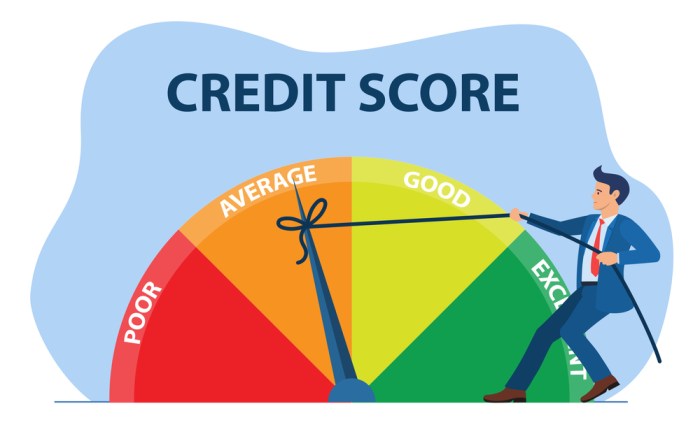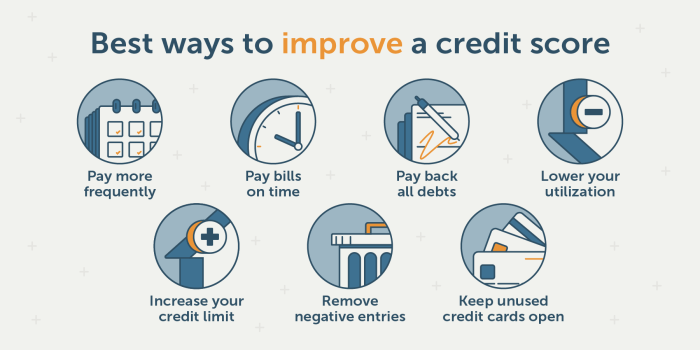Credit Score Improvement is crucial for your financial well-being. Dive into the world of credit scores and discover how you can enhance your financial opportunities with some hip strategies and insights.
Let’s explore the key aspects of credit score improvement, from understanding credit scores to building a solid credit history. Get ready to take charge of your financial future!
Importance of Credit Score Improvement
Having a good credit score is crucial for maintaining financial health. It serves as a reflection of your creditworthiness and can impact your ability to secure loans, credit cards, and even housing. A high credit score demonstrates responsible financial behavior and can open doors to better opportunities.
Impact of a Low Credit Score on Loan Approvals and Interest Rates
- A low credit score can make it difficult to get approved for loans, credit cards, or mortgages.
- Lenders may view you as a high-risk borrower, leading to higher interest rates and less favorable terms.
- Some lenders may even deny your application altogether if your credit score falls below a certain threshold.
Credit Score Improvement for Better Financial Opportunities
- By working to improve your credit score, you can increase your chances of approval for loans and credit cards.
- A higher credit score can result in lower interest rates, saving you money over time.
- Improving your credit score shows financial responsibility and can lead to access to better financial products and opportunities.
Understanding Credit Scores

Credit scores are numerical representations of an individual’s creditworthiness, used by lenders to assess the risk of lending money to that person. These scores are calculated based on various factors and help determine the interest rates and credit limits offered to borrowers.
Factors Influencing Credit Scores
- Payment History: This is the most significant factor in determining a credit score. It reflects whether you have paid your bills on time.
- Amount Owed: The total amount of debt you owe, compared to your credit limits, can impact your credit score.
- Length of Credit History: The longer you have had credit accounts open, the better it is for your credit score.
- New Credit: Opening multiple new credit accounts in a short period can negatively affect your credit score.
- Credit Mix: Having a mix of different types of credit, such as credit cards and loans, can positively impact your credit score.
FICO Score vs VantageScore
FICO score and VantageScore are the two most commonly used credit scoring models. While both use similar factors to calculate credit scores, there are some differences in how they weigh these factors. FICO scores range from 300 to 850, with a higher score indicating better creditworthiness. On the other hand, VantageScore ranges from 300 to 850 as well, but the scoring criteria may vary slightly. It’s essential to monitor both scores to get a comprehensive view of your credit health.
Strategies for Improving Credit Score
When it comes to improving your credit score, there are several key strategies you can implement to see positive results. From regularly checking your credit score to paying bills on time and reducing credit utilization, these practices can help you boost your creditworthiness and financial health.
Checking and Monitoring Your Credit Score Regularly
Regularly checking your credit score is essential for understanding where you stand financially and identifying any areas that may need improvement. By monitoring your credit score, you can catch errors or fraudulent activity early on and take steps to rectify them. You can access your credit report for free once a year from each of the three major credit bureaus – Equifax, Experian, and TransUnion. Additionally, many credit card companies and financial institutions offer free credit score monitoring services to help you stay on top of your credit health.
Importance of Paying Bills on Time
Paying your bills on time is one of the most crucial factors that contribute to your credit score. Late payments can significantly impact your credit score and stay on your credit report for up to seven years. To avoid late payments, set up automatic payments or reminders for your bills. Consistently paying your bills on time will demonstrate to creditors that you are a responsible borrower, ultimately improving your credit score over time.
Reducing Credit Utilization
Credit utilization refers to the amount of credit you are currently using compared to the total amount of credit available to you. Lowering your credit utilization can have a positive impact on your credit score. Aim to keep your credit utilization below 30% to show creditors that you are not overly reliant on credit. You can reduce your credit utilization by paying down existing debts, requesting a credit limit increase, or opening a new credit account to increase your available credit.
Building Credit History

Building a positive credit history is crucial for financial success as it shows lenders that you are a responsible borrower. A good credit history can help you qualify for better interest rates on loans, credit cards, and even rental applications. It can also make it easier to secure financing for major purchases like a car or home.
Establishing Credit for Individuals with No Credit History
- Apply for a secured credit card: This type of credit card requires a cash deposit to secure the credit limit. It’s a great way for individuals with no credit history to start building credit.
- Become an authorized user: Ask a family member or friend with good credit to add you as an authorized user on their credit card. This can help you establish a credit history as their payment history will reflect on your credit report.
- Apply for a credit-builder loan: Some financial institutions offer credit-builder loans where you make small monthly payments that are reported to the credit bureaus, helping you build credit over time.
Impact of Various Credit Accounts on Credit Scores, Credit Score Improvement
- Credit Cards: Having a mix of credit accounts, including credit cards, can positively impact your credit score. However, it’s important to keep your credit card balances low and make on-time payments to avoid negative effects on your score.
- Loans: Installment loans, such as auto loans or personal loans, can also help diversify your credit mix. Making regular payments on these loans can demonstrate your ability to manage different types of credit responsibly.
- Student Loans: Student loans are considered installment loans and can contribute positively to your credit mix. Making timely payments on your student loans can help you build a solid credit history.

